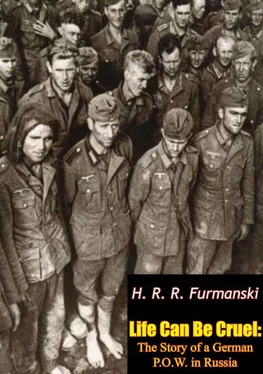My parents built a new bakeshop, larger, more modern. Soon after this, a national calamity befell Germany when Hitler took over the government. Most of the boys of my age joined the Nazi party. I had always been a private citizen—an individualist—and had no wish to wear a uniform of any kind. My mother felt as I did about this new life that was being forced on the nation, but my father insisted that we must join the party in the interests of our business. I could not understand this. Why must a businessman join the party to keep his business? I asked myself. Some years later my father was elected a deputy of the treasury department, then the leader of the bakers, then chairman of some banks, finally leader of all trades in the county. I thought my father was a man obsessed with obtaining such honors as might be bestowed upon him. It was not until much later that I realized what my father was doing.
My mother and I hated the party, because my father was seldom at home, leaving us to care for the business ourselves. Nobody knew what this party was up to. Very often my parents exchanged hard words as they argued over its purposes, something that had never happened before. My father gave his life for the party, to make good for my mother and me. We never joined the party or any organization affiliated with it.
In the meantime I worked hard in the bakeshop, and after five more years I passed the final examination as a master baker. Now my parents’ wishes had been fulfilled. Nobody asked me if I was happy, but I am sure my mother sensed the conflict inside me. It was during this time that I discovered what a great burden a person can carry if he has the will power and faith in God, to the ultimate gain of his self-confidence and character.
My confidence and faith in God were put to the supreme test when I received the order to join the army. The conflict I felt within myself seemed impossible of solution. I went to ask my father if he could defer my order, but he said he could not give preferential treatment even to his own son. I was thereupon conscripted into the army.
There are limits to what any man can endure. I prayed for strength to enable me to carry on. Many times I doubted the love and wisdom of God. My life seemed hard beyond belief, and I sought in vain for an explanation of the disappointments I had been called upon to endure. Disappointed from my first years of life, compelled to the renunciation of my own wishes, pressed into service in a uniform I hated, life seemed very cruel indeed.
But my prayers were granted, and from some source I found the strength to continue. My heart was heavy, but I left our home to join the army.
A new chapter of life began for me, far from home, among strange men with different habits and ways of life. Though each soldier was an individual in his own right, this individuality appeared to be lost within the smothering confines of the army. The uniform seemed to strip us of our very souls. I had a very unpleasant time, more so, perhaps, because I experienced difficulty in adjusting to the loss of identity. I was compelled to call upon all of my strength of character in living up to army regulations, and everyone told me that I was a good soldier. Many times I felt like weeping, not because I considered myself too good for military service or felt that I should be an exception, but because I felt the wrongness of what I was doing. It is possible too that I suffered from a feeling of insecurity, and that, after so many disappointments, I found it hard to take orders from somebody whom I knew to be less well educated than myself. Still, I had the desire to be a good soldier, carried out my duties, and was clean and neat. No one could accuse me of shirking my responsibilities.
My order called for a three-months’ exercise, which time would soon be over, for which I was very glad. However, on the morning of September 1, 1939, we were ordered into the barracks yard to hear the bad news: Germany had declared war on Poland. All my hopes of going home vanished into thin air. Every one of us was asking the same question: Why and how could this happen to us?
Once the news was transmitted a busy schedule began for every unit. Some of us were ordered to be transferred to the infantry, some to the navy or marines. I went immediately to the commander and asked permission to join the medical staff. My papers, education, and records showed that I was qualified, and two weeks later I was on my way to join an army medical school. I was happy, for now I could realize my own desire to be a doctor, and perhaps, by the time I had completed my medical education, the war would be over.
The doctors, astonished at my knowledge and handling of medical matters, gave me more and greater responsibilities, and I took it very seriously, giving my heart and soul to this profession of my choice; nothing was too hard for me. In my letters to my parents I described my satisfaction with my new duties. My mother, reading between the lines, was sorrier than ever that she had been unable to further my desire to be a doctor, but she had been powerless to alter the decision of her husband.
While at the time I had not understood my father’s pride in his own trade, thinking him selfish, in later years I came to understand his wish to preserve the family tradition; he had, I realized, worked very hard to establish and keep his name, and he had stood in the foreground in the Nazi party to save our family and the business which I would carry on. I was like a straw in the wind, dreaming of success in my chosen profession, yet having to follow the course my father had charted for me.
A year passed, and I was still in medical training. My ambition and adherence to duty had resulted in my being promoted to corporal in the medical staff and in being granted a fourteen-day leave. I drove home, overjoyed to see my parents, my sister, and my friends. Those fourteen days passed swiftly, but I enjoyed each one to the fullest, describing in great detail my life in the medical school, proud of my success and forgetting the shadow of disappointment which had darkened my previous life. I rested from the hard work in the hospital, saving my strength for the future. No one could know then what the future held in store. For my part, I made no effort to see too far into the future, living in the present only.
My father’s work with the party kept him very busy, and I saw him only at night, but he was even prouder of my promotion than I was. My leave was over all too soon, and I went back to school, little knowing, as I bade my parents goodbye, that it was goodbye for a long time. Returning to my post, I received order of transfer to the medical staff in a battalion of occupation troops in Holland. It was June, 1940, and the train, rolling west, stopped in several larger towns where more and more soldiers got on board. One evening in early July we arrived at our destination. Some troopers had made quarters in advance, and I found a very good furnished house as medical center. The next day the doctor came to take over as the leader of the medical staff. There were four men in the staff—the doctor, as officer, and three corporals.
Among the occupation troops there were no wounded, and we had only the usual illnesses to contend with. I had time to look around, enjoying my leisure-time strolls in the streets. I saw only the most favorable aspects of a strange country, ate in restaurants and browsed in libraries, met many Dutch people and made friends at once. I never bothered anybody, nor did anybody bother me. I knew I was an intruder, but I tried to be courteous and honest, and I felt that I had won the friendship of these people. I could go back to Holland at any time and find a cordial reception.
We stayed only a short time in this area, but one experience occurred which I will never forget. My medical leader, an officer, had wrecked his own car, and, since it took too long to repair it, he entered a private garage, took a car which belonged to a Hollander, and drove away. The Hollander reported this to the field police of the German Army, and the doctor was arrested and taken to jail. I never saw him again. I could not understand how it was possible for a German officer to steal a car; it was a terrible experience for me, and I was ashamed.
Читать дальше












